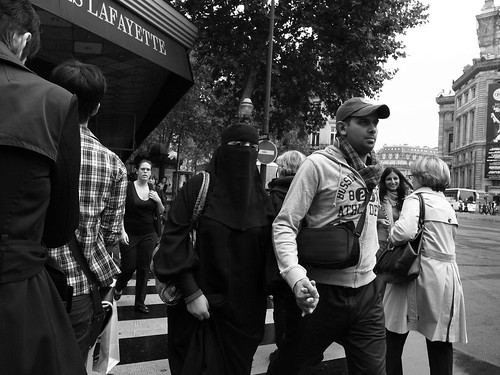 France may have gone on holidays for the summer but public disquiet about laws banning street prayer by Muslims, and the full-face covering veil known as the niqab or burqa, has not abated.
France may have gone on holidays for the summer but public disquiet about laws banning street prayer by Muslims, and the full-face covering veil known as the niqab or burqa, has not abated.
On the eve of the traditional July vacation departure, far-right National Front leader Marine Le Pen received a burst of publicity as the European Union parliament voted to strip her legal immunity.
The decision paves the way for a long-awaited prosecution in France of the extremist politician, who is also a Member of the European Parliament, on charges of racial hatred.
In 2010 Le Pen notoriously compared Muslims praying in French streets—outlawed since 2011 under laws brought in by former president Nicolas Sarkozy—to the Nazi occupation.
“For those who like to talk about World War Two, to talk about occupation, we could talk about, for once, the occupation of our territory,’’ she said. ‘‘There are no armoured vehicles, no soldiers, but it is an occupation all the same, and it weighs on people.” Earlier in 2010, Le Pen had stated, “Very clearly, like in 1940, some think that they can behave in France in 2010 like an occupying army in a conquered country.”
Undaunted by the threat of prosecution and the possibility that she could face a year in prison and a Euro 45,000 fine, Le Pen has reiterated her controversial views about Muslims praying in French streets. Devotees say they have prayed in public either because of lack of room in mosques or because they are required to pray at specific times of the day and don’t always have a private space or prayer room.
The National Front leader claimed she was being pursued for the ‘‘crime of opinion.’’
Her crime was ‘‘to have dare say what all French people think, that street prayers—which as I have pointed out to them continue to be practiced on French territory—are an occupation. I will go before the court head held high and explain to them that it is necessary that there are people in our country who tell the truth to the French.’’
While Le Pen has gone out of her way to fan the flames of social conflict, a young couple, both converts to Islam, attracted worldwide attention this month when riots broke out in a Paris suburb after the woman was asked to remove her face veil for a police identity check.
Trappes, a hardscrabble neighborhood populated mainly by immigrants and their children and grandchildren, many of them Muslim, exploded on a Ramadan evening following the the routine control. It is claimed the husband of the veiled woman attacked police and even tried to strangle one officer. He was taken into police custody and will face court in September. A few hours after the identity check incident, following prayers signalling the end of the daily Ramadan fast, hundreds of boys in their teens and early twenties gathered in front of the polices station and fought with officers, while burning bins, bus shelters, and public areas in Trappes. An adolescent boy lost the use of an eye when police used tear gas and “flash ball” stun guns to subdue the violence that continued for several nights.
Since the violence the French press has been filled with reports and commentaries questioning whether the riots could rightfully be linked to religion or whether they should be considered as a reaction to long-term social exclusion of youth in poor immigrant suburbs where their unemployment rate is above 26 percent. Socialist Interior Minister Manuel Valls has insisted the Sarkozy-era ban on the full face-covering veil will remain because it is ”a law in the interests of women and against those values having nothing to do with our traditions and values. It must be enforced everywhere.”
Although there have been a minority of voices on the left critiquing his hard line, Valls has been supported across the political spectrum including by feminists and ecologists, as well as on the center-right (which calls for an even tougher enforcement of laws and says Valls has been too soft in reaction to the riots). Corinne Lepage, the former French Environment Minister wrote that the Trappes affair ‘‘should leave no republican indifferent. It is the symbol of a violent rejection on the part of a very small section of our Muslims co-citizens, who have opted for Salafism or Wahabism, against everything that makes up our common culture.’’ Therefore, Lepage argued, the law on the burqa was ‘‘essential and could not be negotiable. The conception of the woman that it throws up is incompatible with our conception and those of our co-citizens, who consider that their freedom is breached by this manifestation of submission, and they must know that they are in violation of public order.’’
I wrote an opinion piece for The Financial Review commending the Socialist government’s commitment to maintaining laws against women or anyone wearing face-concealing clothing in the public space. France has a strong secular tradition. Indeed laïcité or secularism is the fourth value of the republic after Liberty, Equality, and Fraternity. There is no conflict between legally backing freedom of religious expression, and in the interests of common French republican values including those of equality and secularism banning what is commonly known as the burqa or niqab on the streets. Street prayer laws if applied equally to religious of all faith backgrounds can be justified in terms of the historic French commitment to a neutral, secular public space. But Muslims need places to pray, including more mosques and prayer rooms. The political mainstream needs to take more care not to make French Muslims in particular feel like they are being targeted for simply practicing their religion.
Tags: Burqa, France, Francois Hollande, secularism

